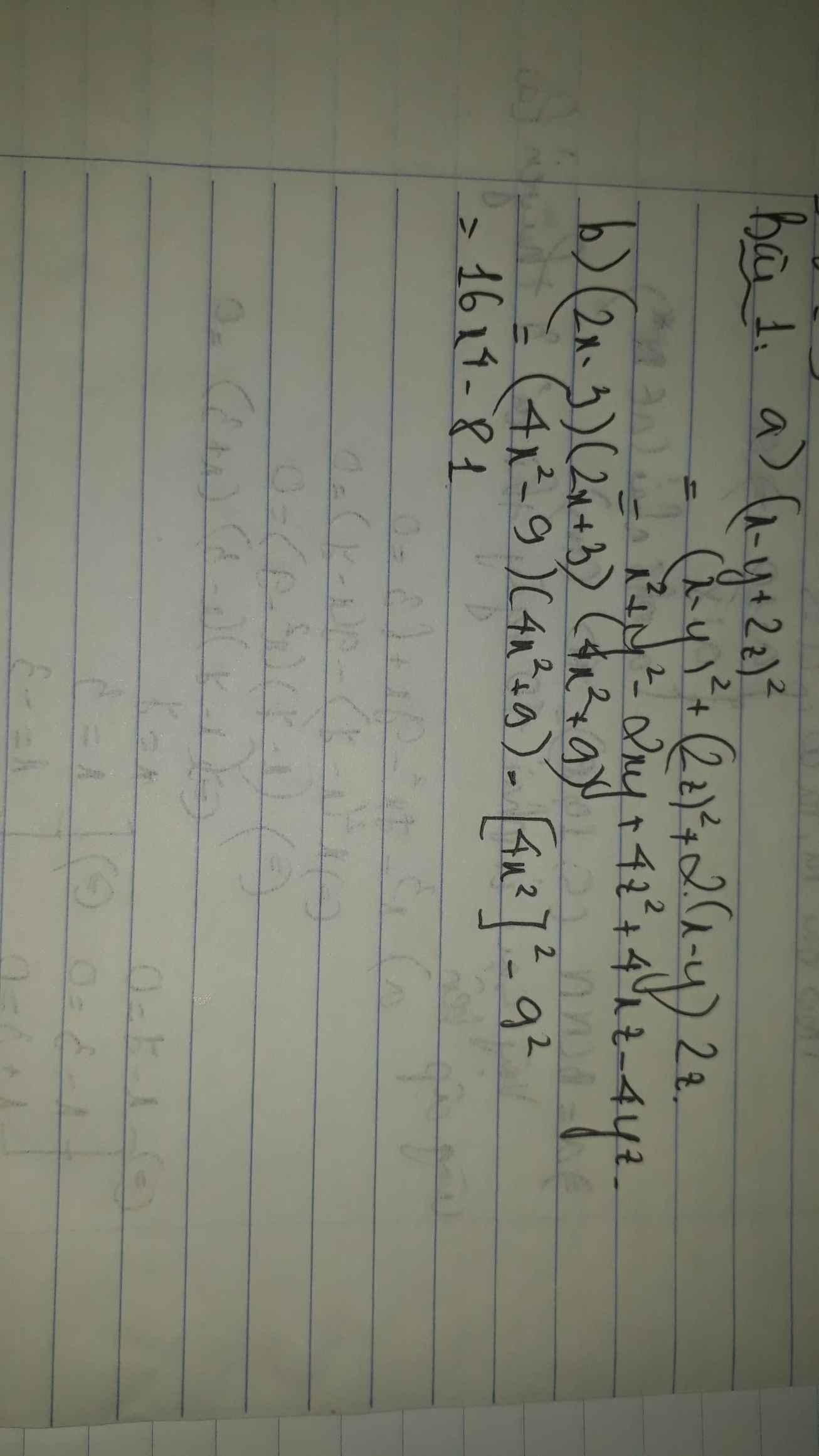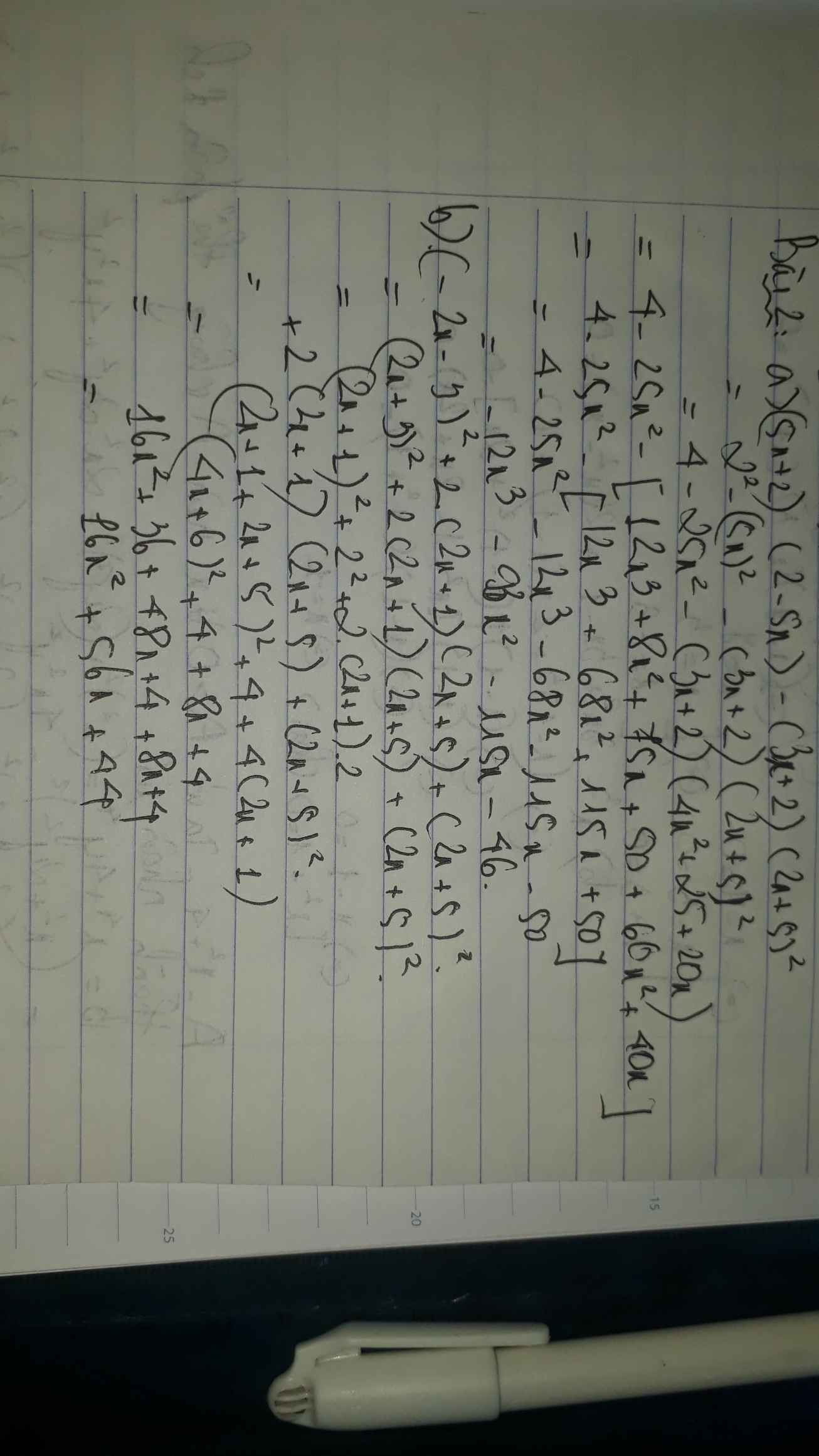(2x-3)2+4x2-9=(2x-3)(3x+5)

Những câu hỏi liên quan
Bài 1: Giải các phương trình dưới đây1) x2 - 9 (x - 3)(5x +2)2) x3 - 1 (x - 1)(x2 - 2x +16)3) 4x2 (x - 1) - x + 1 04) x3 + 4x2 - 9x - 36 05) (3x + 5)2 (x - 1)26) 9 (2x + 1)2 4 (x - 5)27) x2 + 2x 158) x4 + 5x3 + 4x2 09) (x2 - 4) - (x - 2)(3 - 2x) 010) (3x + 2)(x2 - 1) (9x2 - 4) (x + 1)11) (3x - 1)(x2 + 2) (3x - 1)(7x - 10)12) (2x2 + 1) (4x - 3) (x - 12)(2x2 + 1)
Đọc tiếp
Bài 1: Giải các phương trình dưới đây
1) x2 - 9 = (x - 3)(5x +2)
2) x3 - 1 = (x - 1)(x2 - 2x +16)
3) 4x2 (x - 1) - x + 1 = 0
4) x3 + 4x2 - 9x - 36 = 0
5) (3x + 5)2 = (x - 1)2
6) 9 (2x + 1)2 = 4 (x - 5)2
7) x2 + 2x = 15
8) x4 + 5x3 + 4x2 = 0
9) (x2 - 4) - (x - 2)(3 - 2x) = 0
10) (3x + 2)(x2 - 1) = (9x2 - 4) (x + 1)
11) (3x - 1)(x2 + 2) = (3x - 1)(7x - 10)
12) (2x2 + 1) (4x - 3) = (x - 12)(2x2 + 1)
1: \(\Leftrightarrow\left(x-3\right)\left(x+3\right)-\left(x-3\right)\left(5x+2\right)=0\)
\(\Leftrightarrow\left(x-3\right)\left(-4x+1\right)=0\)
hay \(x\in\left\{3;\dfrac{1}{4}\right\}\)
2: \(\Leftrightarrow\left(x-1\right)\left(x^2+x+1\right)-\left(x-1\right)\left(x^2-2x+16\right)=0\)
\(\Leftrightarrow\left(x-1\right)\left(x^2+x+1-x^2+2x-16\right)=0\)
\(\Leftrightarrow\left(x-1\right)\left(3x-15\right)=0\)
hay \(x\in\left\{1;5\right\}\)
3: \(\Leftrightarrow\left(x-1\right)\left(4x^2-1\right)=0\)
\(\Leftrightarrow\left(x-1\right)\left(2x-1\right)\left(2x+1\right)=0\)
hay \(x\in\left\{1;\dfrac{1}{2};-\dfrac{1}{2}\right\}\)
4: \(\Leftrightarrow x^2\left(x+4\right)-9\left(x+4\right)=0\)
\(\Leftrightarrow\left(x+4\right)\left(x-3\right)\left(x+3\right)=0\)
hay \(x\in\left\{-4;3;-3\right\}\)
5: \(\Leftrightarrow\left[{}\begin{matrix}3x+5=x-1\\3x+5=1-x\end{matrix}\right.\Leftrightarrow\left[{}\begin{matrix}2x=-6\\4x=-4\end{matrix}\right.\Leftrightarrow\left[{}\begin{matrix}x=-3\\x=-1\end{matrix}\right.\)
6: \(\Leftrightarrow\left(6x+3\right)^2-\left(2x-10\right)^2=0\)
\(\Leftrightarrow\left(6x+3-2x+10\right)\left(6x+3+2x-10\right)=0\)
\(\Leftrightarrow\left(4x+13\right)\left(8x-7\right)=0\)
hay \(x\in\left\{-\dfrac{13}{4};\dfrac{7}{8}\right\}\)
Đúng 1
Bình luận (0)
1.
\(\Leftrightarrow\left(x-3\right)\left(x+3\right)=\left(x-3\right)\left(5x-2\right)\)
\(\Leftrightarrow x+3=5x-2\)
\(\Leftrightarrow4x=5\Leftrightarrow x=\dfrac{5}{4}\)
2.
\(\Leftrightarrow\left(x-1\right)\left(x^2+x+1\right)=\left(x-1\right)\left(x^2-2x+16\right)\)
\(\Leftrightarrow x^2+x+1=x^2-2x+16\)
\(\Leftrightarrow3x=15\Leftrightarrow x=5\)
3.
\(\Leftrightarrow4x^2\left(x-1\right)-\left(x-1\right)=0\)
\(\Leftrightarrow\left(x-1\right)\left(4x^2-1\right)=0\)
\(\Leftrightarrow\left[{}\begin{matrix}x=1\\x=\dfrac{1}{2};x=-\dfrac{1}{2}\end{matrix}\right.\)
Đúng 1
Bình luận (1)
7.
\(\Leftrightarrow x^2+2x-15=0\)
\(\Leftrightarrow\left(x-3\right)\left(x+5\right)=0\)
\(\Leftrightarrow\left[{}\begin{matrix}x=3\\x=-5\end{matrix}\right.\)
8.\(\Leftrightarrow x^4+x^3+4x^3+4x^2=0\)
\(\Leftrightarrow x^3\left(x+1\right)+4x^2\left(x+1\right)=0\)
\(\Leftrightarrow\left(x+1\right)\left(x^3+4x^2\right)=0\)
\(\Leftrightarrow\left[{}\begin{matrix}x=-1\\x=0;x=-4\end{matrix}\right.\)
9.\(\Leftrightarrow\left(x-2\right)\left(x+2\right)=\left(x-2\right)\left(3-2x\right)\)
\(\Leftrightarrow x+2=3-2x\)
\(\Leftrightarrow3x=1\Leftrightarrow x=\dfrac{1}{3}\)
Đúng 1
Bình luận (0)
Xem thêm câu trả lời
4x−2+xx+1x
Đọc tiếp
`4x=2+xx+1x<=>4x=2+3x<=>4x-3x=2<=>1x=2<=>x=2`
Đúng 1
Bình luận (1)
Bài 3: Rút gọn các biểu thức sau:
1) ( x+ 3)(x2 -3x + 9) - (x3 + 54)
2) (2x + y)(4x2 + 2xy + y2 ) - (2x – y)(4x2 + 2xy + y2 )
3) (x – 1)3 – (x + 2)(x2 -2x +4) +3(x +4)(x – 4)
4) x(x + 1)(x - 1) – (x + 1)(x2 – x +1)
5) 8x3 - 5 (2x + 1)(4x2 – 4x + 1)
6) 27 + (x – 3)(x2 +3x + 9)
7) (x – 1)3 – (x +2)(x2 -2x + 4) +3(x +4)(x -4)
8) (x – 2)3 +6( x – 1)2 –(x +1)(x2 -x +1) +3x
1: Ta có: \(\left(x+3\right)\left(x^2-3x+9\right)-\left(x^3+54\right)\)
\(=x^3+27-x^3-54\)
=-27
2: Ta có: \(\left(2x+y\right)\left(4x^2-2xy+y^2\right)-\left(2x-y\right)\left(4x^2+2xy+y^2\right)\)
\(=8x^3+y^3-8x^3+y^3\)
\(=2y^3\)
Đúng 1
Bình luận (0)
\(1,=x^3+270-x^3-54=-27\\ 2,=8x^3+y^3-8x^3+y^3=2y^3\\ 3,=x^3-3x^2+3x-1-x^3-8+3x^2-48=3x-57\\ 4,=x^3-x-x^3-1=-x-1\\ 5,=8x^3-5\left(8x^3+1\right)=-32x^3-5\\ 6,=27+x^3-27=x^3\\ 7,làm.ở.câu.3\\ 8,=x^3-6x^2+12x-8+6x^2-12x+6-x^3-1+3x\\ =3x-3\)
Đúng 3
Bình luận (0)
Giải phương trình1) 2x ( x – 3 ) + 5 ( x – 3 ) 02) ( x2 – 4 ) – ( x – 2 ) ( 3 – 2x ) 03) ( 2x – 1 )2 – ( 2x + 5 )2 114) ( 2x + 1 )2 ( 3x – 5 ) 4x2 – 15) 3x2 – 5x – 8 06) ( 2x + 1 )2 ( 3x – 5 ) 4x2 – 17) 3x2 – 5x – 8 08) left|x-5right|39) left|2x-5right|3-x10) left|2x+1right|left|x-1right|11) dfrac{5x+2}{6}-dfrac{8x-1}{3}dfrac{4x+2}{5}-512) dfrac{3x+2}{2}-dfrac{3x+1}{6}2x+dfrac{5}{3}
Đọc tiếp
Giải phương trình
1) 2x ( x – 3 ) + 5 ( x – 3 ) = 0
2) ( x2 – 4 ) – ( x – 2 ) ( 3 – 2x ) = 0
3) ( 2x – 1 )2 – ( 2x + 5 )2 = 11
4) ( 2x + 1 )2 ( 3x – 5 ) = 4x2 – 1
5) 3x2 – 5x – 8 = 0
6) ( 2x + 1 )2 ( 3x – 5 ) = 4x2 – 1
7) 3x2 – 5x – 8 = 0
8) \(\left|x-5\right|=3\)
9) \(\left|2x-5\right|=3-x\)
10) \(\left|2x+1\right|=\left|x-1\right|\)
11) \(\dfrac{5x+2}{6}-\dfrac{8x-1}{3}=\dfrac{4x+2}{5}-5\)
12) \(\dfrac{3x+2}{2}-\dfrac{3x+1}{6}=2x+\dfrac{5}{3}\)
1) Ta có: \(2x\left(x-3\right)+5\left(x-3\right)=0\)
\(\Leftrightarrow\left(x-3\right)\left(2x+5\right)=0\)
\(\Leftrightarrow\left[{}\begin{matrix}x=3\\x=-\dfrac{5}{2}\end{matrix}\right.\)
2) Ta có: \(\left(x^2-4\right)-\left(x-2\right)\left(3-2x\right)=0\)
\(\Leftrightarrow\left(x-2\right)\left(x+2\right)+\left(x-2\right)\left(2x-3\right)=0\)
\(\Leftrightarrow\left(x-2\right)\left(3x-1\right)=0\)
\(\Leftrightarrow\left[{}\begin{matrix}x=2\\x=\dfrac{1}{3}\end{matrix}\right.\)
3) Ta có: \(\left(2x-1\right)^2-\left(2x+5\right)^2=11\)
\(\Leftrightarrow4x^2-4x-1-4x^2-20x-25=11\)
\(\Leftrightarrow-24x=11+1+25=37\)
hay \(x=-\dfrac{37}{24}\)
Đúng 1
Bình luận (0)
5) Ta có: \(3x^2-5x-8=0\)
\(\Leftrightarrow3x^2+3x-8x-8=0\)
\(\Leftrightarrow3x\left(x+1\right)-8\left(x+1\right)=0\)
\(\Leftrightarrow\left(x+1\right)\left(3x-8\right)=0\)
\(\Leftrightarrow\left[{}\begin{matrix}x=-1\\x=\dfrac{8}{3}\end{matrix}\right.\)
8) Ta có: \(\left|x-5\right|=3\)
\(\Leftrightarrow\left[{}\begin{matrix}x-5=3\\x-5=-3\end{matrix}\right.\Leftrightarrow\left[{}\begin{matrix}x=8\\x=2\end{matrix}\right.\)
10) Ta có: \(\left|2x+1\right|=\left|x-1\right|\)
\(\Leftrightarrow\left[{}\begin{matrix}2x+1=x-1\\2x+1=1-x\end{matrix}\right.\Leftrightarrow\left[{}\begin{matrix}2x-x=-1-1\\2x+x=1-1\end{matrix}\right.\)
\(\Leftrightarrow\left[{}\begin{matrix}x=-2\\x=0\end{matrix}\right.\)
Đúng 1
Bình luận (0)
Bài 1: Khai triển hằng đẳng thức:
a, ( x - y + 2z )2
b, ( 2x-3 ). ( 2x+3 ) . ( 4x2+9 )
Bài 2: Rút gọn biểu thức:
a, ( 5x+2 ).( 2-5x ) - ( 3x+2 ).( 2x+5 )2
b, ( -2x-3 )2 + 2(2x+1).( 2x+5 ) + ( 2x+5 )2
Bài 1:
a, \(\left(x-y+2z\right)^2=x^2+y^2+4z^2-2xy-4yz+4zx\)
b, \(\left(2x-3\right)\left(2x+3\right)\left(4x^2+9\right)=\left(4x^2-9\right)\left(4x^2+9\right)=16x^4-81\)
Đúng 1
Bình luận (0)
Xem thêm câu trả lời
Tính:
a)(3x+2)2-(4-2x).(5x+1)
b)(2x-3).(9+6x+4x2)-(2x+3)3
\(a,=9x^2+12x+4-18x-4+10x^2=19x^2-6x\\ b,=8x^3-27-8x^3-36x^2-54x-27=-36x^2-54x-54\)
Đúng 3
Bình luận (0)
(x2 + 9) (9x2 -1) = 0
(4x2 -9) (2x-1 -1) =0
( 3x+2) (9-x2 ) =0
(3x+3)2 ( 4x - 42 ) =0
2(x-5) ( x+2) =1
a: (x^2+9)(9x^2-1)=0
=>9x^2-1=0
=>x^2=1/9
=>x=1/3 hoặc x=-1/3
b: (4x^2-9)(2^(x-1)-1)=0
=>4x^2-9=0 hoặc 2^(x-1)-1=0
=>x^2=9/4 hoặc x-1=0
=>x=1;x=3/2;x=-3/2
c: (3x+2)(9-x^2)=0
=>(3x+2)(3-x)(3+x)=0
=>\(\left[{}\begin{matrix}3x+2=0\\3-x=0\\3+x=0\end{matrix}\right.\Leftrightarrow x\in\left\{-\dfrac{2}{3};3;-3\right\}\)
d: (3x+3)^2(4x-4^2)=0
=>3x+3=0 hoặc 4x-16=0
=>x=4 hoặc x=-1
e: \(2^{\left(x-5\right)\left(x+2\right)}=1\)
=>(x-5)(x+2)=0
=>x-5=0 hoặc x+2=0
=>x=5 hoặc x=-2
Đúng 2
Bình luận (0)
Bài 5: Tìm nghiệm của các đa thức sau: Dạng 1: a) 4x + 9 b) -5x + 6 c) 7 – 2x d) 2x + 5 Dạng 2: a) ( x+ 5 ) ( x – 3) b) ( 2x – 6) ( x – 3) c) ( x – 2) ( 4x + 10 ) Dạng 3: a) x2 -2x b) x2 – 3x c) 3x2 – 4x d) ( 2x- 1)2 Dạng 4: a) x2 – 1 b) x2 – 9 c)– x 2 + 25 d) x2 - 2 e) 4x2 + 5 f) –x 2 – 16 g) - 4x4 – 25 Dạng 5: a) 2x2 – 5x + 3 b) 4x2 + 6x – 1 c) 2x2 + x – 1 d) 3x2 + 2x – 1
1.(x2+3).(x4-3x2+9)
2.(2x+1).(4x2-2x+1)
3.(x2+2).(x4-2x2+4)
4.(3x+2).(9x2-6x+4)
\(1,=x^6+27\\ 2,=8x^3+1\\ 3,=x^6+8\\ 4,=27x^3+8\)
Đúng 1
Bình luận (0)
1. (x2 + 3)(x4 - 3x2 + 9)
= x6 + 27
2. (2x + 1)(4x2 - 2x + 1)
= 8x3 + 1
3. (x2 + 2)(x4 - 2x2 + 4)
= x6 + 8
4. (3x + 2)(9x2 - 6x + 4)
= 27x3 + 8
Đúng 0
Bình luận (0)
1: \(\left(x^2+3\right)\left(x^4-3x^2+9\right)=x^6+27\)
2: \(\left(2x+1\right)\left(4x^2-2x+1\right)=8x^3+1\)
3: \(\left(x^2+2\right)\left(x^4-2x^2+4\right)=x^6+8\)
4: \(\left(3x+2\right)\left(9x^2-6x+4\right)=27x^3+8\)
Đúng 0
Bình luận (0)


























